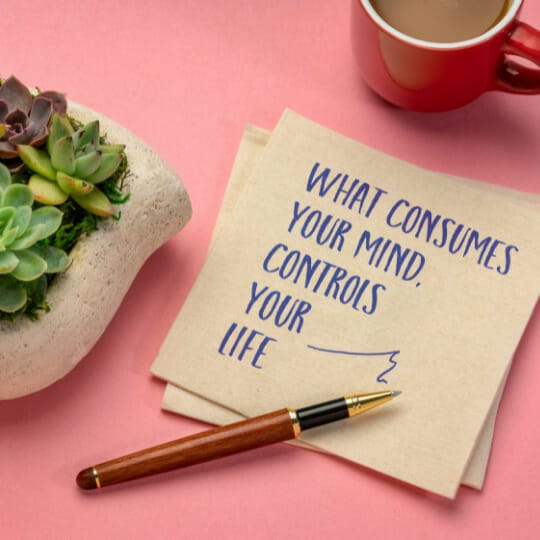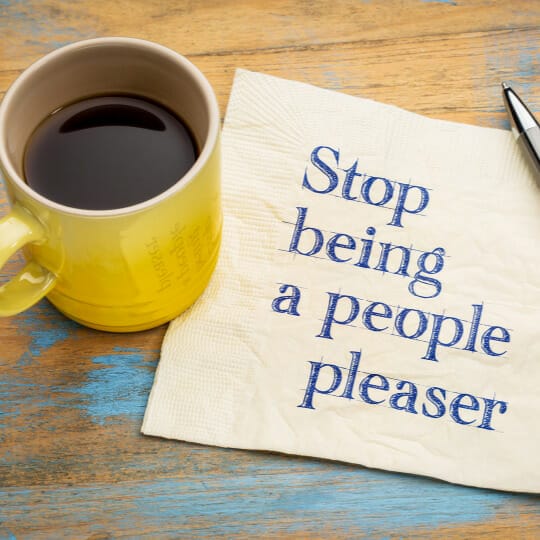
A lot of people say that they want to find their purpose. They start the journey but end up getting stuck. Why is that? What do we actually need to do to find purpose?
Today I want to talk about some blocks that a lot of people face. They might be blocks that are stopping YOU from finding your purpose. I’m going to talk to you about how to work through them so you can finally find your purpose.
If you are struggling to find or define your purpose, check your locus of control.
Your locus of control is the degree to which you believe that you have control over your life, as opposed to external forces that are beyond your influence.
Conceptually, this ‘locus’ is either internal – a belief that you can control your own life, or external – a belief that your life is controlled by outside factors that you can’t influence – that things are all down to fate or chance.
If your locus of control is largely external, you tend to think things like:
“It’s too hard to succeed.”
“The market is saturated, I can’t stand out.”
If your locus of control is more internal, you tend to think things like:
“I can learn how to become successful.”
“I can learn how to become attractive to others.”
Notice the difference in the language–internal control is signified by sentences that begin with the letter “I”!!
If your locus of control is largely external, then you have probably always left your purpose to chance or fate, or blocked yourself from considering the notion that you could succeed on your own terms.
Consequently, you may not have given much thought to what your purpose could be – perhaps your focus has always been on what it couldn’t be.
According to Psychology Today, researchers found that of more than 7,500 British adults who were followed since birth, those who had shown an internal locus of control at the age of ten were less likely to be overweight at age thirty, less likely to describe their health as poor or show high levels of psychological stress. The major explanation for these findings was that children with a more internal locus of control behave more healthily as adults because they have greater confidence in their ability to influence outcomes through their own actions. They may also have higher self-esteem.

What could this mean for finding your purpose?
There is something you can do right now. You can start watching your thoughts and changing the language to what you can do, rather than what’s stopping you.
This takes daily work but is worth it!
It’s going to take a few months, but over time, changing this dialogue will make so much difference to the way you see the world, and possibilities will start to show themselves because you have shifted your focus.
Try it and see for yourself.
Create a dedicated practice of intentionally pursuing your future and letting go of the internal dialogue that it’s out of your control.
Notice what changes when you do this.
Hire a coach to help you with this if you need to. This is a long game and it is life changing but you might need some support along the way.
People I’ve coached who like to put others first often have very little idea of who they are and what they stand for, and consequently what they want.
If you’ve spent many years trying to fit in, trying to please other people, and wanting to be liked, then please know that those things are more outward-focused.
And if you are trying to find your purpose, it can be pretty difficult if all you have ever done is worry about other people and what interests them and what they value.
Knowing that this can be a block to finding your purpose is a great thing because it frees you up to finally start paying attention to what’s important to you, and to what you value so that you can finally find your purpose.

Putting others first often means being busy all the time, and not sitting still to be mindful and present, and both are great ways of avoiding getting to know and understand yourself.
Before you can identify your purpose, you need to go on the journey of finding yourself.
This is a scary but very interesting and rewarding journey. It is an enriching journey where you get to learn what you like and don’t like, what you do and don’t want, and what’s important to you and what you value.
You will invariably feel some discomfort as you start to realise that there are people and things in your life that no longer serve you.
There will be some pushback from people who don’t like the new you, or who are affronted by the fact that you won’t be so focused on them and their needs anymore.
That’s OK.
Be prepared.
If you want to find your purpose, you need to clear away everything that doesn’t serve you in order to find what does.
You need to create the space and stop being busy and stop attending to everybody else’s needs so that you can focus on what it is that you want for your life.
Then, you can truly start to find your purpose!
If you’re stuck finding your purpose and don’t know why, or how to move forward, I invite you to consider some things that might be getting in the way:
If you would like help with finding yourself, I’ll be developing a short course on this later in the year. Hit me up on my contact page if you’d like to be notified of the release.
Understanding who you are and what you need will allow your business to thrive! If you’re truly ready to break old habits and get out of the rut I encourage you to check out the Habitology membership.
Learn more here:
© 2024 Melanie White